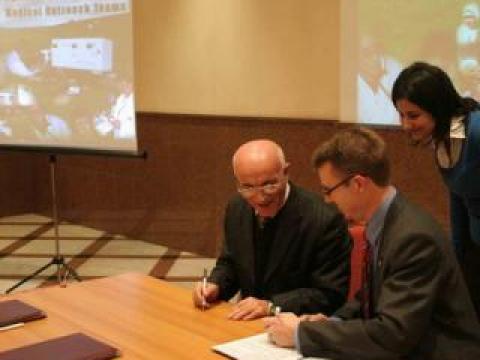World Vision hands over rural health care programme to Armenian Government

A Memorandum of Understanding (MOU) signed in Yerevan on December 10 recognises the commitment by the government and local authorities to ensure the continuation of improved access to quality healthcare services in rural Armenian communities.
The USAID-funded MOT project, which started in February 2004, was implemented in the four regions of Tavush, Lori, Gegharkunik, and Syunik.
The project is not only significant in terms of the results achieved but also in our policy making “The project is not only significant in terms of the results achieved but also in our policy making. The challenges and achievements we witnessed at the beginning of the project had their impact on the strategy development in this field,” said Tatul Hakobyan, Deputy Minister of Health.
MOTs, consisting of general practitioners, gynaecologists, paediatricians, laboratory technicians, and ultrasound specialists, worked together with local health institutions and provided more than 91,000 quality consultations to remote border communities.
According to the MOU, World Vision Armenia will hand over major project assets, including medical equipment and vehicles, to primary health care institutions to ensure the sustainability of the MOT.
Over the five-year period of MOT project implementation more than 88,000 health education materials were developed in Armenian language that were not previously available to rural populations.
Some 53 health facilities were renovated, furnished and equipped to enhance their capacity and provide quality health care services and 63 revolving drug funds were established in communities to increase access to essential pharmaceuticals.
About 300 local health care providers were trained in quality primary health care delivery and 250 active community members were engaged in peer education that lately disseminated the gained knowledge in their communities.
Pap-Smear testing was initiated by MOT in rural areas, and is now done by cytologists from district level primary health care facilities “Pap-Smear testing was initiated by MOT in rural areas, and is now done by cytologists from district level primary health care facilities”, said Arax Hovhannisyan, World Vision Armenia Health Technical Adviser, adding that more than 3,000 Pap-Smear tests have been conducted since the launch of the project as part of a strategy to prevent cervical cancer and other complications.
The MOT project has proven to be a good model of cooperation between international organisations and the Armenian Government, district health facilities and communities with the important goal to profoundly improve and maintain the health and well-being of Armenia’s children and their families.
The USAID-funded MOT project, which started in February 2004, was implemented in the four regions of Tavush, Lori, Gegharkunik, and Syunik.
The project is not only significant in terms of the results achieved but also in our policy making “The project is not only significant in terms of the results achieved but also in our policy making. The challenges and achievements we witnessed at the beginning of the project had their impact on the strategy development in this field,” said Tatul Hakobyan, Deputy Minister of Health.
MOTs, consisting of general practitioners, gynaecologists, paediatricians, laboratory technicians, and ultrasound specialists, worked together with local health institutions and provided more than 91,000 quality consultations to remote border communities.
According to the MOU, World Vision Armenia will hand over major project assets, including medical equipment and vehicles, to primary health care institutions to ensure the sustainability of the MOT.
Over the five-year period of MOT project implementation more than 88,000 health education materials were developed in Armenian language that were not previously available to rural populations.
Some 53 health facilities were renovated, furnished and equipped to enhance their capacity and provide quality health care services and 63 revolving drug funds were established in communities to increase access to essential pharmaceuticals.
About 300 local health care providers were trained in quality primary health care delivery and 250 active community members were engaged in peer education that lately disseminated the gained knowledge in their communities.
Pap-Smear testing was initiated by MOT in rural areas, and is now done by cytologists from district level primary health care facilities “Pap-Smear testing was initiated by MOT in rural areas, and is now done by cytologists from district level primary health care facilities”, said Arax Hovhannisyan, World Vision Armenia Health Technical Adviser, adding that more than 3,000 Pap-Smear tests have been conducted since the launch of the project as part of a strategy to prevent cervical cancer and other complications.
The MOT project has proven to be a good model of cooperation between international organisations and the Armenian Government, district health facilities and communities with the important goal to profoundly improve and maintain the health and well-being of Armenia’s children and their families.
Share